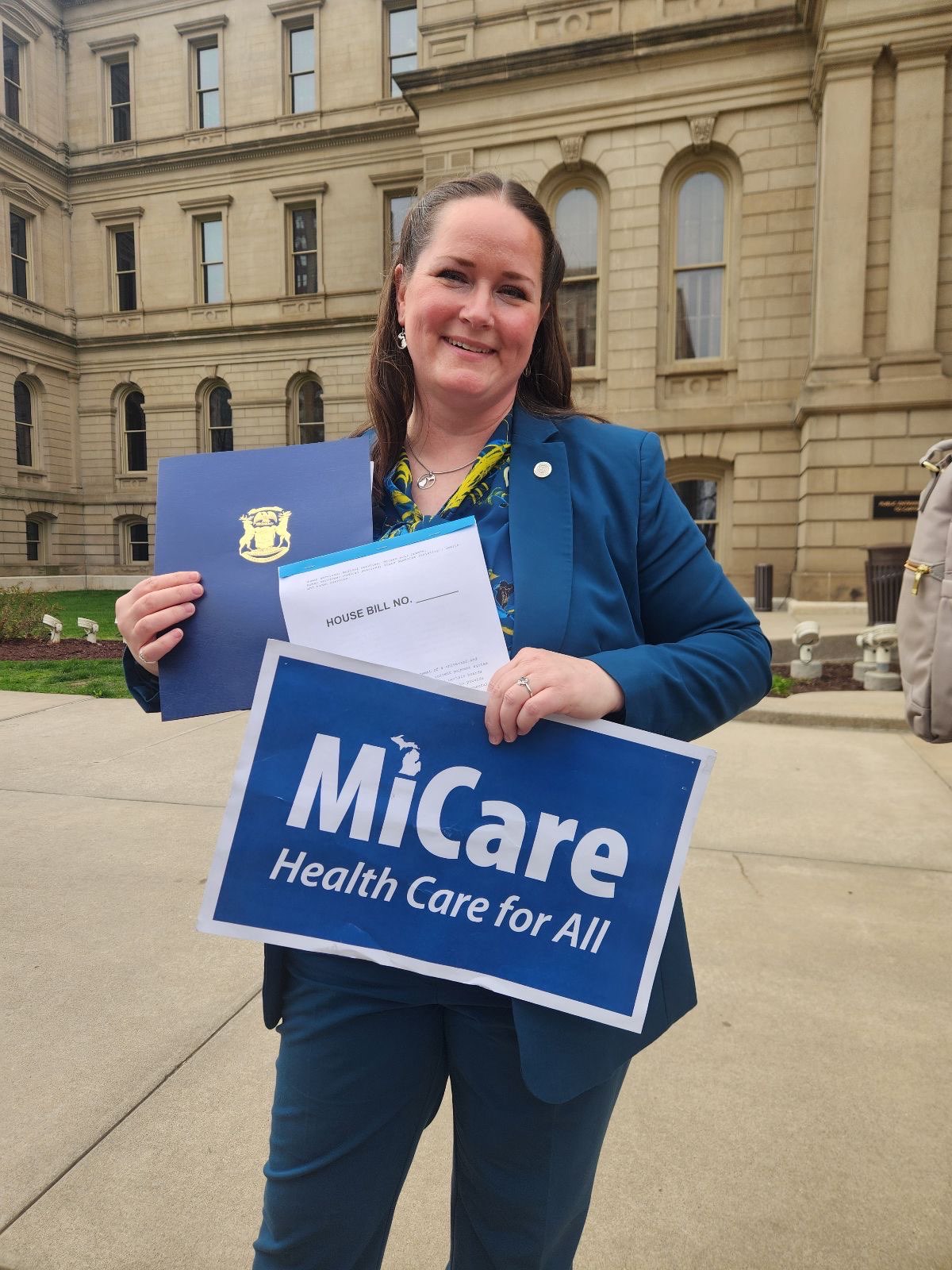Legislation to create a universal health care payment system for Michigan
LANSING, Mich., May 1, 2025 — State Rep. Carrie A. Rheingans (D-Ann Arbor) reintroduced her legislation that would create the MiCare program, a universal, publicly financed health care system for all Michigan residents (HB 4407).
“Health care is a fundamental human right. All 10 million Michiganders, regardless of where in the state they live, deserve to have high quality, affordable health care and the freedom that comes with that. No Michigan resident should have to live in fear of becoming bankrupt if they or their loved one get sick, something many people with health insurance still worry about,” Rheingans said.
“The profit-motivated health care system that we have has been failing us for far too long. We pay more for health care in America than anywhere else in the world. Yet, we are not healthier, nor we do not live longer on average than our counterparts in other countries.Our system has not fully recovered from COVID, including massive provider burnout, and we are likely to see drastic cuts to Medicaid in the coming months, translating into hundreds of thousands of Michiganders losing health care coverage. Added together, our health care system is barreling towards the point of a total collapse. We need a plan to completely rebuild it, and MiCare is that way forward.”
As of last year, 47% of American adults said that it was very or somewhat difficult to afford their health care costs, 21% of American adults said that they or a family member in their household did not fill a prescription in the last year due to cost, and 61% of uninsured adults said they went without needed care because of the cost.
Patients, advocates and providers agree: this is unacceptable. Colleen Schoenfeld, a Manchester resident and former Apache helicopter pilot, like so many others, has to navigate the complexities of our current health care system to ensure that she and her children can receive basic medical care.
“I receive all my medical care through the VA but do not qualify for dental,” Schoenfeld said. “My children and I rely on Medicaid to help with their medical expenses and our dental care. I believe all Michiganders should have access to quality health and dental care. I am so grateful to Rep. Rheingans for introducing and spearheading MiCare for all Michiganders.”
MiCare will be a publicly financed system, using today’s mix of private and public providers to deliver comprehensive physical, dental and behavioral health care for all Michiganders with no deductibles, copays or premiums. The system will be designed to save Michiganders money by cutting down on excessive administrative costs and treating health care like a right, instead of a for-profit industry.
Audrey Gerard, a community organizer with Michigan United and a resident of the Upper Peninsula, understands just what it would mean for residents of the U.P. and rural Michiganders to have guaranteed, affordable health care for all.
“In the Upper Peninsula, access to quality health care isn’t just a policy debate – it’s a matter of survival,” Gerard said. “People are driving hours for basic services, skipping prescriptions because of the cost, and putting off care until it’s too late. MiCare is the common sense solution we need. It guarantees health care as a human right, not a privilege, and would finally give U.P. residents the security and dignity we deserve. No more choosing between groceries and a doctor’s visit. It’s time to invest in our communities, not corporate insurance profits.”
For many religious people like Pastor Dale Milford of Farmington Hills, ensuring that everyone has affordable health care is a moral imperative.
“Sacred texts universally implore us to love all our neighbors,” Milford said. “When we deny any of God’s children access to quality health care, that’s not just a policy failure; it’s our failure to live out that most essential commandment. It’s our moral duty to ensure that healing is within reach for everyone.”
It’s not just patients and advocates, practitioners in the field see how broken our current system is. Jamie Brown, RN, a critical care nurse and President of the Michigan Nurses Association, has witnessed the challenges of our current system and the need for change firsthand.
“Passing MiCare would help stop the tragedy of so many people delaying or skipping lifesaving care simply because they can’t afford it,” Brown said. “As an ICU nurse, I see the human cost of our broken health care system every day; too many people can’t afford to take care of their chronic illness and end up getting sicker and paying with their lives. Nurses want to see change that ensures everyone – not just the wealthy and privileged – can access lifesaving care.”
From Detroit to Marquette, Rheingans crisscrossed the state last term, holding a series of town halls on her MiCare legislation. She heard from Michiganders about their experiences with the current health care system and explained how MiCare would operate.
“No matter what corner of the state I was in, I heard the same sorts of things at every town hall,” Rheingans said. “So many people had a story about themselves or a loved one fighting with health insurance companies to get them to cover necessary medical care. Others talked about being stuck in a job they didn’t like or a dangerous relationship in order to maintain their health insurance coverage or taking on crushing medical debt to ensure their spouse could get lifesaving cancer treatment. In the wealthiest nation in the world, this is unacceptable.”
Rheingans, a health policy expert, acknowledges that this major health care system change will be an uphill battle. “I ran for this office to make universal health care a reality for Michiganders. I will not stop fighting for universal, affordable health care, even if it takes the rest of my time in the legislature.”
###

